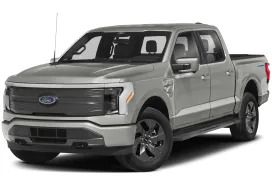When Ford switched to aluminum bodywork on the Ford F-150 in 2015 to cut the truck's weight, potential buyers spent a good while in online discussions wondering whether repair costs would skyrocket. In 2015, the Highway Loss Data Institute — an affiliate of the Insurance Institute for Highway Safety — damaged the front and rear corners of an aluminum-bodied and a steel-bodied F-150 as a test. The HLDI determined that repairing the front corner on the aluminum truck cost 10% more than the steelie, while the rear corner cost 26% more on the aluminum truck. In practice, however, it didn't work out like that. Consumer Reports said prices should remain about even, and despite the rare horror story, in 2019, with real-world data, the same HLDI wrote, "Ford F-150 repair costs remain steady despite use of aluminum." Seems it's a little different over at Rivian at the moment, where an owner received a $40,000 repair estimate for his R1T after a fender-bender.
Via Carscoops, the story's told by Matt "The Dent Slayer" Boyette on YouTube. Boyette runs a paintless dent repair (PDR) shop in Jacksonville, Georgia. He said a Rivian owner in North Carolina got in touch when a fender bender resulted in damage below the R1T's driver's side taillight. Boyette says "the only certified [Rivian repair] shop" near the owner "quoted around $40,000" to replace the bedside, which runs up and over the doors to the base of the A-pillars, and that subsequently the owner's insurance wanted to total out the truck. Instead, the owner got in touch with Boyette's company, All Out PDR. Boyette said he watched a lot of videos and looked at a lot of pictures before agreeing to take on the job, after which the owner put his Rivian on a car hauler for the 500 miles to Jacksonville.
Check out the short video above for the superhero job All Out PDR pulled off. Boyette explains the process and why a traditional body shop would come up with a $40,000 quote for a parking lot mishap; the way the R1T's body panels are laid out, a shop needs to dismantle a fair amount of the truck to access the necessary areas. He didn't say how much the customer ultimately paid, but All Out PDR only took three days to do its work, so the total would have been far less than the $40K estimate even with the R1T's 1,000-mile round trip from North Carolina to Florida and back.
Having a look around the web, though, this particular area on the Rivian seems to be the R1T's Achilles heel. When an R1T owner in Ohio got rear-ended in February of this year, resulting in what looked like very mild damage, the Rivian-certified repair shop gave him a $42,000 estimate. When Rich Rebuilds — the YouTuber who started by making his own Tesla out of scrapped bits of random Teslas — got his R1T rear-ended earlier this year, the shop estimated repairs at more than $37,000. Last December, a third R1T owner got a $10,000 estimate to attempt to fix some paint scuffs and small dents in the same area, along with the proviso that if the attempt didn't work, the shop would need another $20,000 to replace the panel. In his case, a mobile PDR shop showed up and spent 10 hours fixing the dent for $3,500.
Counterpoint: The Internet loves such horror stories, but they're not the norm. The New York Times spoke to the Ohio R1T owner and looked into the repair figures for the EV industry, writing, "Data from Mitchell [an insurance and repair shop software company] shows that in 2022 electric vehicles cost about $6,800 on average to fix after accidents, about $2,400 more than the average for all cars." The difference is largely explained by EVs generally being newer and more luxurious, and potentially needing "work by specialist mechanics." Tesla's overwhelming market share makes it alone responsible "for 75 percent of collision claims for battery-powered models." The article said that Hyundai and Nissan EVs only average about $800 more for repairs than their gas-powered siblings, and there's rough parity when considering exclusively luxury EVs against luxury gas-powered vehicles. Finally, "Other data suggests that electric vehicles fare relatively well. About 18 percent of gasoline cars involved in crashes are totaled, while only about 6 percent of battery-powered vehicles are deemed unrepairable after accidents, according to Mitchell."
Anyone want to place early bets on Tesla Cybertruck repair costs?




Sign in to post
Please sign in to leave a comment.
Continue